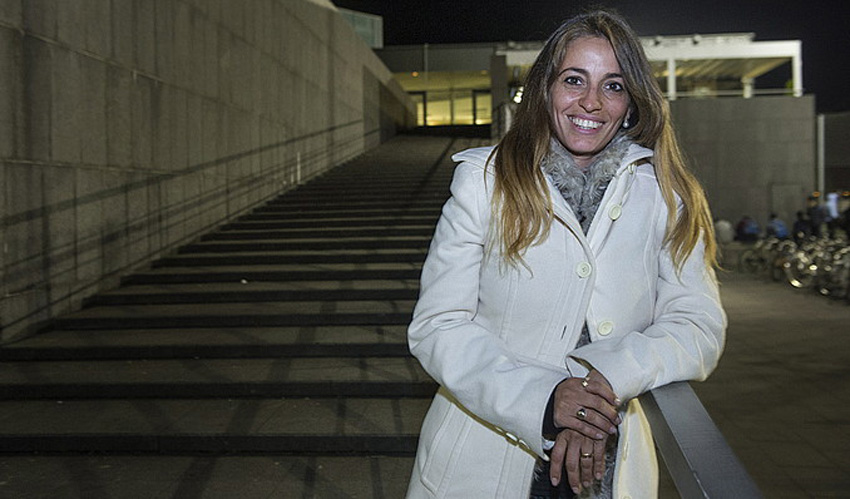OIhintza Elustondo. Rocio Basterra (Viedma, Argentina, 1980) came to the Basque Country on vacation. She comes whenever she can, even though she lives in Argentina. “I am missing something there, and when I come here it enlightens something in me. I don’t know how but I was born with two souls in one body!” Her vacation ends on Sunday and she will take advantage of these last days to speak Basque.
-You are from Argentina and you speak wonderful Basque. Many would be envious…
If I told you the truth, I hear that all the time. When I tell people that I learned Basque in Argentina and that I live there, they are surprised. I think that the more people I tell, it helps ease their fear of learning Basque. For me, the most important thing is to tell people, not to brag, but so that people will say: ‘This girl is very normal and is a Basque speaker living in Argentina. How is that possible?’ With passion and effort of course!”
-Today you have a dinner with Basque friends. Anyone would think that you were from here…
Yes, but my pronunciation gives it away. And i am proud to be from abroad. Because then I know that i am helping Euskera and the struggle for it.
-Your last name is Basque. Do you have Basque ancestors?
My first last name is Basterra and my second is Del Vall Iturria. My ancestors were from Navarre: dad’s family from near Erribera, in Caseda, and my mother’s family comes from Elizondo.
-Did that encourage you to learn Basque?
I always say two things: even if my last name were Espageti, I would still learn Basque and defend the Basque culture, just the same. It’s not just about the color of your blood. It is a charming world a culture that has been so persecuted and that continues after thousands of years. There must be something to it, no? Something that I can’t explain. When I was introduced to Euskera, it was love at first sight. On the other hand, to be Basque is to speak Basque.
-You feel Basque even if you are Argentinean?
Yes, I feel that way, if you let me feel that way. To tell you the truth, I feel very Argentinean, I love my country but I also have another homeland.
-How did you learn Basque?
Online, and later I had the opportunity to go to Maizpide (Barnetegi in Lazkao). I was there for six months studying Basque morning and night, and if you don’t learn it there, you won’t learn it anywhere. I lived with a family in Ordizia, and there I learned to speak like they do in Goierri. The world of dialects fascinates me. What a rich language! Its heritage is humanity, and people will realize that eventually. I’m sure of it.
-Now, you teach Basque at a Basque club in Patagonia.
When I studied law, I lived in Bahia Blanca and in the mornings, I traveled 300 kilometers to Patagonia. I taught in my town and in some others, ten hours to adults, youth and children. And I returned home at night another 300 kilometers. I did it once a week and I had to stop doing so many other things to do so. Now, I teach at the Basque club in Viedma and Patagones. I am convinced that I have to defend Basque from where I am, and I will continue to do so.
-Are Argentineans interested in Basque?
Our activities make them interested: last year, the Itziarren Semeak group performed for free; on New Year’s Eve we flew an Ikurrina from the main plaza….If you catch a Basque club activity, you make contact with Euskera because I want to put Euskera all over. We have begun a newsletter and we try to put the headlines at least in Basque. We have also begun to include some Basque film, little by little, in our activities; we want to show them in Euskera with subtitles, because the audience wants to hear it. These activities attract local people, and not just those who have something to do with the Basque culture.
-Your goal is to spread Basque culture in the world?
My goal is for people to all in love with Euskera and the Basque culture; from there, you can achieve everything. You have to create this love. Later it goes on its own.
-You presented a TV program in ETB1 in Euskera: Yes we jai.
Being from abroad, and speaking Basque helps people reflect. I did it with all my conviction. I knew that I wanted to be Basque and I work hard to live in Euskera. I am very clear about that. The question is what you want to be.






 Send to a friend
Send to a friend Add comment
Add comment








